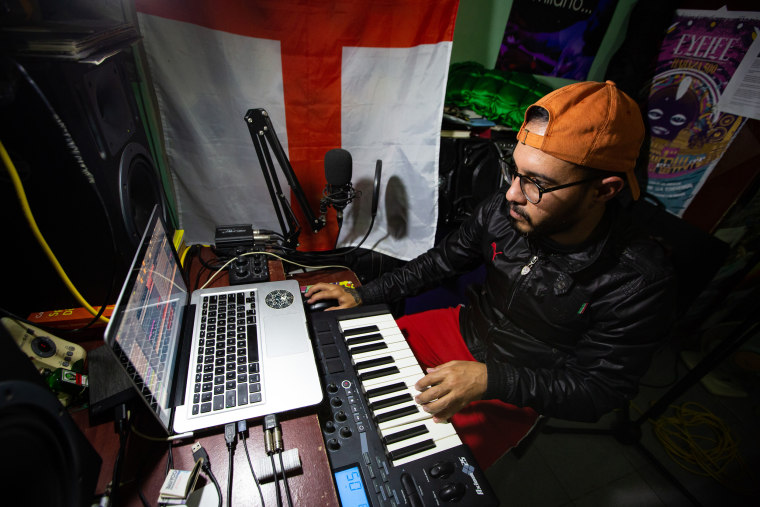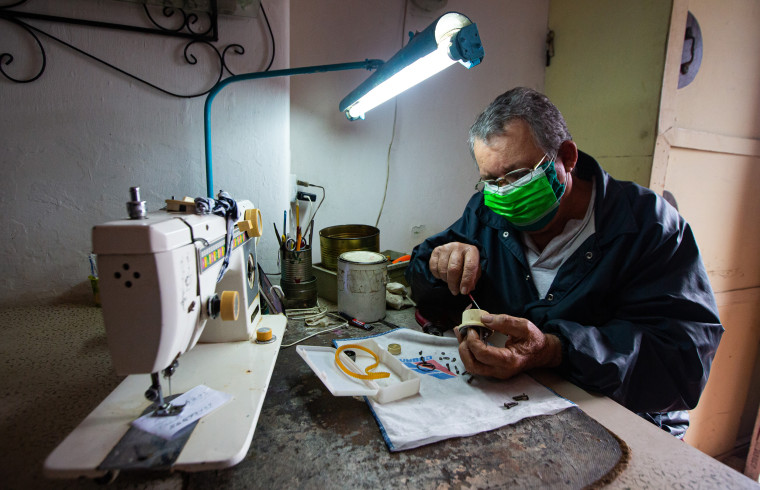HAVANA — Nestled in his bedroom studio under vinyl records and a cluster of microphones, DJ Milano makes electronic music that combines traditional Cuban sounds with modern beats. It is a tortuous process.
“We can’t use certain applications because they are blocked,” said DJ Milano, 33, who hasn’t been able to update Rekordbox, the platform he needs to mix samples, as he can’t get a protected virtual network for his Mac computer. “I have no way of buying it — I have the money in my bank, but you can’t use Cuban bank cards to buy online.”
Sixty years ago Thursday, President John F. Kennedy signed an executive order which began the “embargo on all trade with Cuba." Despite some changes through the decades, the embargo has endured so long that it has become the longest sanctions regime in modern history.
Throughout the island today, the effects are clear.
Log in to PayPal in Cuba and you’re greeted with this message: “Access Denied.” On Amazon: “Unable to process this order.” Try downloading an app on the Apple App Store: “unavailable in the country or region you are in.”
Software developer Eduardo Perez, 27, lost all the programming he had done for his university thesis a few years ago when the source code repository GitLab suddenly restricted access from Cuba. He spent months rewriting the code before access was restored.
“It’s so trivial,” he said. “They take away access and then they give it back.”

Unable to bid for freelance contracts on upwork.com, he loses out on jobs. “I understand that there are sanctions,” he said, “but they are supposed to be against the government, not the people.”
Those who visit the island today can see the impact of the sanctions and 60 years of a highly inefficient centrally planned communist economy: Crumbling buildings dot Havana’s post-apocalyptic skyline, 1950s Chevrolets and Cadillacs rumble on, yellow street lamps flicker at night.
For many tourists, Cuba’s “frozen in time” feel is part of the island’s allure. For its residents, it has meant living with chronic shortages and deteriorating economic conditions, aggravated by the Covid-19 lockdown, which shut down tourism. Last summer’s historic protests against the government reflected the frustration and anger with the current situation.
By the time Kennedy signed the executive order in 1962, Cuba's government had nationalized billions of dollars in U.S. property — the largest expropriation ever of U.S. assets — and moved into the Soviet Union’s orbit. The Bay of Pigs invasion had failed dramatically, and Fidel Castro formally declared Cuba a socialist state.
But even before the Soviets got involved in 1962, the Eisenhower administration had decided to use sanctions as part of the toolkit to overthrow Castro, according to declassified documents.
“Every possible means should be undertaken to promptly weaken the economic life of Cuba,” Lester D. Mallory, then the deputy assistant secretary of state for Western Hemisphere affairs, said in April 1960, arguing that U.S. policy should aim “to bring about hunger, desperation and overthrow of government.”
Although the U.S. can export food and medicine to Cuba under the embargo, the laws significantly limit the amount of goods that can be sent, even from third countries.
Critics of the embargo, including human rights groups, such as Oxfam, have called for the sanctions to be lifted, saying they “hamper access to inputs, medical technologies, medical equipment, and other essential basic items” for everyday Cubans.
The sanctions amount to “collective punishment" that is incompatible with human rights, said Alfred de Zayas, a professor of international law at the Geneva School of Diplomacy and a retired senior lawyer with the office of the U.N. High Commissioner for Human Rights.
“It is a fundamental principle of law that each person has the right to be treated individually and fairly and not punished for crimes or offenses he or she has not committed,” he said.
But critics of the Cuban government see the embargo as the gift that keeps on giving — for the Cuban leadership.
“It’s allowed them to blame other countries, in this case the U.S., for its own inability to create wealth and well-being,” said Manuel Cuesta Morúa, a vice president of the Cuban Democratic Transition, an opposition group outlawed on the island.
“The government has used [the sanctions] to stall the internal reforms the country needs,” Morúa said.
Making do with what's possible
Together with a stagnant economy, the sanctions have propelled Cubans to come up with gutsy, creative and often bizarre ways to make do with what they can get.
“Everybody knows about their cars,” said Emily Morris, an economist at the Institute of the Americas at University College London. “And that’s symbolic: If you look at the cars, you realize how the economy’s kept going. There’s a whole capacity to adapt existing machinery to give it a longer life or to make it do things it wasn’t designed for.”
For want of traditional glass airlocks, some Cubans use condoms to monitor fermentation when they make wine. Because they lack ball bearings, athletes use old medicine pots for grips on skipping ropes that allow the cords to rotate. Priced out of ventilators and vaccines on the international market during the pandemic, the island manufactured its own.
A functionary said in an interview on condition of anonymity for security reasons that because of the difficulty of making wire transfers from the island, he has flown many times to Canada, his suitcase flush with millions of dollars, to purchase oncological medical equipment.
After former President Barack Obama softened the embargo and re-established diplomatic relations, Trump restored and strengthened the restrictions, issuing over 240 economic measures against the island: Cruise ships were prevented from docking, flights were cut back, U.S. firms were authorized to sue multinational companies making money from their former property, and tankers carrying petroleum from Venezuela were fined for docking in Cuba.
Sen. Marco Rubio, R-Fla., widely seen as the architect of the Trump-era sanctions, said in an emailed statement that the changes were necessary to hold the regime accountable. Ending the embargo, he argued, is up to the ruling Communist Party.
“The U.S. embargo is now codified in law and clearly lays out what the regime must do to end it,” Rubio said, citing “free, fair and multiparty elections,” the release of “all political prisoners,” freedom of the press and a return of property “expropriated by the Cuban regime to American citizens.”
Rubio has previously argued that “there is no embargo on Cuba” as such, but rather “an embargo on the Cuban regime.”
But U.S.-Cuba policy, including the embargo, isn’t strictly along partisan lines, with Democrats recently divided around the country's recent protests.
President Joe Biden hasn’t lifted any of the current restrictions; Secretary of State Antony Blinken recently said the government is “looking at the whole policy” on Cuba. He said Biden is focused on human rights following the Cuban government’s crackdown and arrests after the July 11 protests.
Assistant Secretary of State Brian Nichols told lawmakers Thursday that the administration had received recommendations for easing remittances and would send temporary officers to the embassy in Havana to ease visa processing, Reuters reported.
Easing remittances would be welcome news for Armando Collazo, 72, a retired sewing machine repairman. He used to walk around the block to his local Western Union every month to pick up the equivalent of $100 that his daughter sent him from Florida. Since remittances were banned two years ago, things have gotten dicey.
“Now she has to find someone traveling here to bring me the money — they rip her off,” Collazo said, adding that his daughter has “miraculously” managed to remit him money every month. But with U.S. flights to all cities but Havana no longer running, this economic lifeline has run dry for many Cubans.
Collazo, who battles stomach ulcers and heart disease, said that a few years ago he could get the medicine he and his wife needed for a few cents. Now they are short and must stand in “huge lines” outside his local pharmacy when the drugs they need occasionally come in.
Perhaps because of the rise of social media, perhaps because many have become so fed up with the government’s failure to improve the economy, a tendency to simply deny the embargo’s existence has grown in recent years in Cuba. A fringe belief before, it is now held by a small but significant minority. “No hay bloqueo” (“There is no blockade”) has become a common rebuttal, especially among young people, of the government’s claim that the sanctions constitute a “blockade.”
New technology, enforcement boost sanctions
Technology has made the sanctions easier to enforce.
While Cuba has long been forbidden to use U.S. dollars, in the past customers and suppliers could find workarounds. But the advances in computing and a tightening of anti-money-laundering efforts over the last 15 years have put an end to Cuba’s ability to use dollars, as well as euros.
“We are at an all-time high,” said a Western businessman operating on the island. “Banks all over the world have upped their game on money laundering. This means it’s far harder to conceal the Cuban relationship behind the payment.”
Sources say that following stiff fines in U.S. courts over the last decade, the pool of banks in Europe prepared to receive wire transfers from Cuban banks has shrunk. That in turn has raised costs and reduced the range of clients and suppliers the island can do business with.

The Trump administration’s decision to put the island back on the State Department’s list of state sponsors of terrorism has only increased the risk of doing business with Cuba. Cuban banks last year took the unprecedented step of suspending cash bank deposits in dollars.
Politics vs. intelligence findings
Over the years, a chasm has opened between U.S. politicians and intelligence agencies about the embargo. A secret CIA 1982 case study, published by the National Security Archive, a public interest research center in Washington, D.C., concluded that two decades from their imposition, the sanctions had “not met any of their objectives.” The embargo, the study found, “did little to weaken” the government’s position but did provide the Cuban government with a “scapegoat.”
“The intelligence community has long said — analytically — that the embargo wasn’t working and wouldn’t work,” said Fulton Armstrong, a former national intelligence officer for Latin America who is now a senior fellow at American University’s Center for Latin American and Latino Studies. “Analysts correctly identified the embargo as enhancing government nationalist credibility, even though most Cubans also don’t exonerate the Communist Party for its failed economic policies."
For Hal Klepak, a professor emeritus of history and strategy at the Royal Military College of Canada, “there is no occasion in modern history where one sees a great power sanctioning a small power for a period of time similar to that of the present U.S.-Cuban situation.”
“The stakes are high,” he said. “If you install a government in a region which takes as a given that its first needs are health, education, free funerals, access to the arts and sports and only afterwards democracy, if you bring that into play in a region where those are the aspirations of the vast majority of the population, you are ipso facto a threat to the whole structure of the post-colonial world in Latin America.”
But if it hasn’t rocked the Cuban government, why does the embargo endure?
His answer: “Because it hasn’t succeeded yet!”
https://www.nbcnews.com/news/latino/sixty-years-us-embargo-imprint-affects-cubans-daily-lives-rcna14719
No comments:
Post a Comment